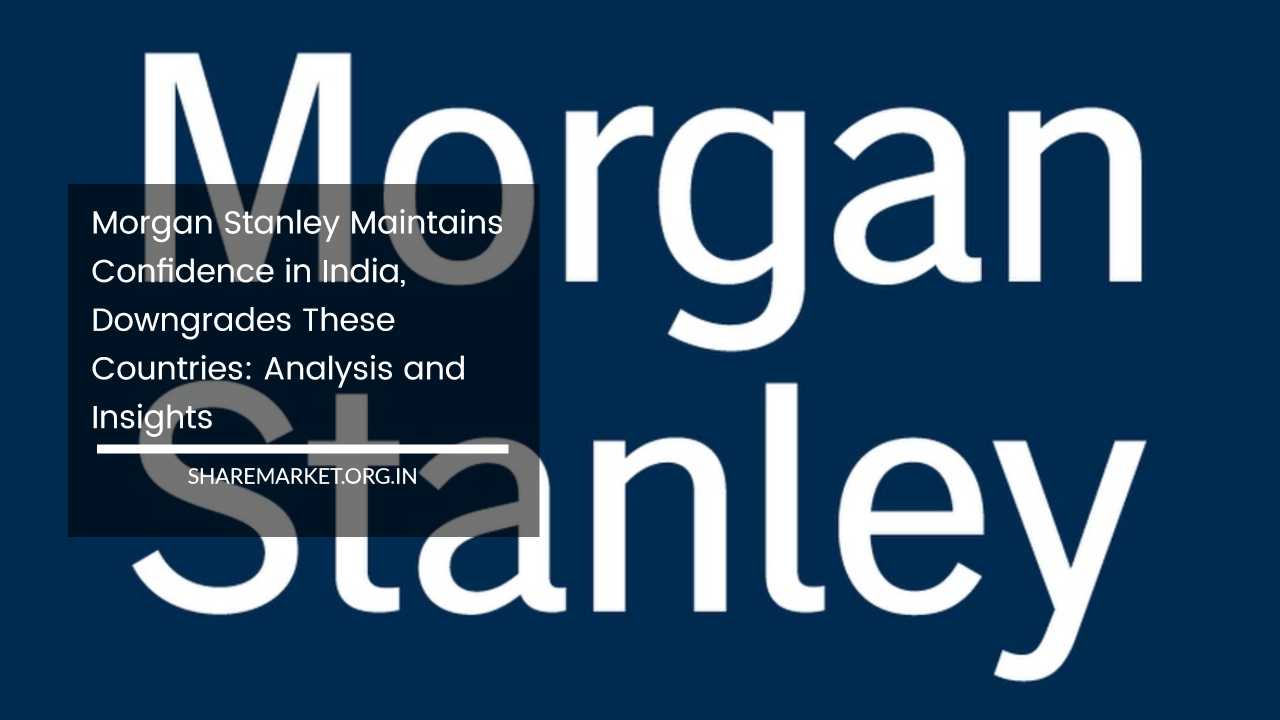Morgan Stanley Maintains Confidence in India, Downgrades These Countries: Analysis and Insights

Morgan Stanley
Morgan Stanley’s recent report presents a comprehensive analysis of the evolving global investment landscape, with particular attention to emerging markets and select countries’ performance.
The report outlines various factors affecting these markets, as well as changes in the outlook for specific countries and regions.
In this increasingly complex environment, Singapore and Poland have emerged as noteworthy upgrades, while South Korea and the United Arab Emirates (UAE) have seen downgrades in their market status.
These shifts in market assessments reflect Morgan Stanley’s continuous efforts to provide investors with valuable insights and guidance.
Market Challenges
The report begins by acknowledging the challenges facing emerging markets. Changes in earnings estimates have been applying pressure to stocks in developing countries.
Additionally, the strength of the US dollar has exacerbated this issue, affecting the valuation of assets denominated in other currencies.
Moreover, political tensions have escalated on a global scale, further complicating investment decisions. Finally, the real yield on 10-year US bonds has reached levels not witnessed since the period before the 2007 financial crisis, leading to concerns about asset valuations and investment opportunities.
India’s Resilience
Amidst these challenges, India stands out as a beacon of optimism within the emerging markets. According to Jonathan Garner, the Head of Emerging Markets at Morgan Stanley, India remains the firm’s preferred choice among emerging markets.
Garner highlights India’s consistent performance, both historically and in the foreseeable future.
India’s performance has been nothing short of remarkable. From the early months of 2021 through October 2022, its performance in dollar terms exceeded that of the MSCI Emerging Markets by a significant margin, registering a 45.5 percent increase. This impressive track record positions India as a market likely to continue outperforming its peers.
Several factors contribute to India’s positive outlook. Domestic investment is on the rise, and foreign direct investment (FDI) and portfolio flows into India are increasing rapidly.
This influx of investment capital speaks to the attractiveness of India as an investment destination. Moreover, India’s earlier concern about high inflation has been alleviated with the latest inflation figures.
In September, the Consumer Price Index (CPI) decelerated to 5 percent, and the Core CPI slowed to 4.6 percent. Economists anticipate further moderation, with expectations that inflation will fall below 5 percent in October.
Other Emerging Markets
The report also offers insights into the market status of other developing countries. Notably, Singapore and Poland have been upgraded to “overweight” status.
An “overweight” rating suggests an optimistic outlook for these markets and encourages a higher allocation of investment capital.
Singapore has a reputation for being a defensive choice during bear markets. Presently, the market is exhibiting strong earnings and profitability trends, enhancing its appeal to investors.
The positive performance of Singapore can be attributed to several factors, including its strategic location as a global financial hub and its commitment to economic stability and growth.
Poland, on the other hand, has seen a positive shift in its outlook. This change comes in the wake of recent elections that suggest the possibility of an opposition coalition government.
Such a development is seen as a positive sign for investors, as it is expected to increase the influx of funds from the European Union and reduce the financial burden on domestic banks.
This political shift demonstrates the interconnectedness of political developments and market dynamics.
In contrast, South Korea and the United Arab Emirates (UAE) have been downgraded to “equal weight.” A “equal weight” rating suggests a more neutral stance on these markets.
South Korea may benefit from a semi-cycle recovery in 2024, but persistent macroeconomic concerns make a substantial rating upgrade unlikely in the near term.
These concerns encompass the Bank of Korea’s dovish monetary policy stance, high levels of household leverage, and a widening energy trade deficit, all of which could lead to higher domestic inflation and margin challenges.
The UAE, despite having a relatively favorable corporate outlook, has seen its market rating downgraded.
The downgrade is attributed to geopolitical uncertainties and higher cyclicality compared to other Gulf countries. Geopolitical tensions and fluctuations in oil prices can significantly impact the UAE’s economic stability.
Final Remarks
Morgan Stanley’s report provides valuable insights into the evolving landscape of emerging markets. It acknowledges the challenges these markets face, including changes in earnings estimates, a strong US dollar, political tensions, and concerns about asset valuations. However, it also identifies countries that stand out amid these challenges.
India’s performance remains impressive and consistent, making it Morgan Stanley’s preferred choice among emerging markets.
The country’s track record, supported by increased domestic and foreign investment, suggests it will continue to outperform its peers.
Singapore and Poland have been upgraded to “overweight” status, thanks to strong economic fundamentals and promising political developments. Conversely, South Korea and the UAE have been downgraded due to lingering macroeconomic concerns and geopolitical uncertainties.
Investors should heed these ratings and insights, as they provide valuable guidance in navigating the complex world of emerging markets and making informed investment decisions.

















